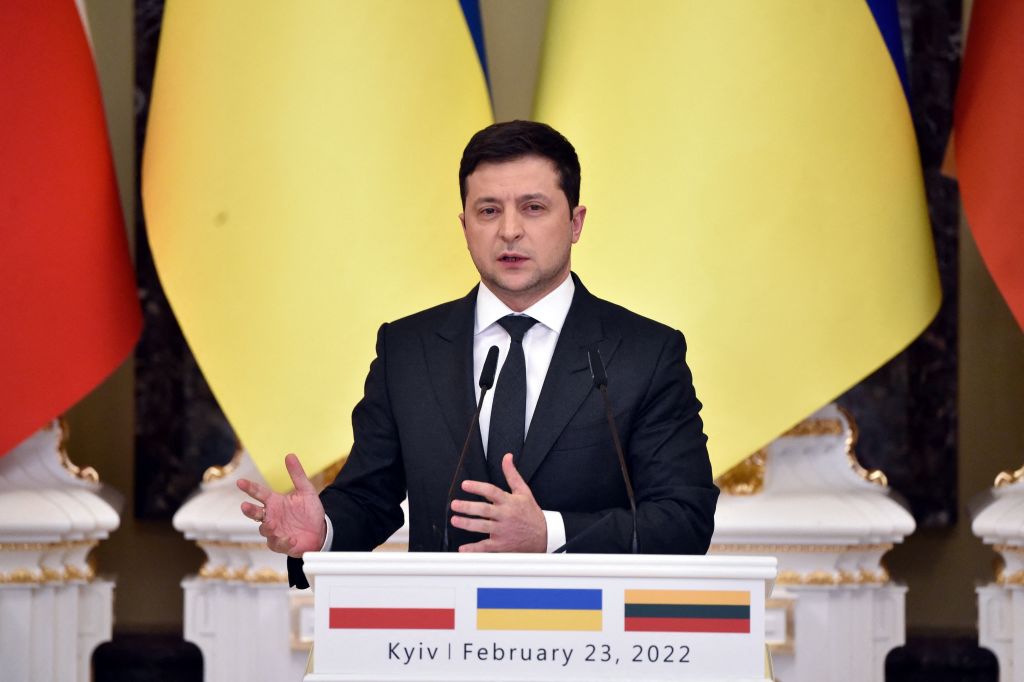Putin pledges to 'de-Nazify' Ukraine, which is led by a non-Nazi Jewish president


A free daily email with the biggest news stories of the day – and the best features from TheWeek.com
You are now subscribed
Your newsletter sign-up was successful
Russian President Vladimir Putin formally declared his intention to invade Ukraine early Thursday, and by all accounts he launched a full-scale attack across the country. After two separatist enclaves of Ukraine, which Putin had recognized as independent "republics" on Monday, asked for help, Putin said in a televised speech, he "decided to conduct a special military operation." The point of that operation, Putin added, is the "demilitarization and de-Nazification of Ukraine."
Ukraine isn't led by Nazis. In fact, its far-right parties earned a combined 2 percent of the vote in 2019 parliamentary elections. It is, however, led by a Jewish president, Volodymyr Zelensky. For a brief while at the beginning of Zelensky's term, Ukraine also had a Jewish prime minister. It is possible for Jewish people to be Nazis, even though a core goal of Nazi Germany was the extermination of Jews, but Zelensky, a former comedic actor, is not one.
After invading Ukraine, Putin tried to wash his hands of the coming bloodshed. His plans "don't include occupation of Ukrainian territory, we are not going to impose anything on anyone by force," Putin claimed in his televised speech. "Russia cannot feel safe, develop, and exist with a constant threat emanating from the territory of modern Ukraine," he said. "All responsibility for bloodshed will be on the conscience of the ruling regime in Ukraine."
The Week
Escape your echo chamber. Get the facts behind the news, plus analysis from multiple perspectives.

Sign up for The Week's Free Newsletters
From our morning news briefing to a weekly Good News Newsletter, get the best of The Week delivered directly to your inbox.
From our morning news briefing to a weekly Good News Newsletter, get the best of The Week delivered directly to your inbox.
Putin also warned other countries not to interfere with his quick-strike takeover of a sovereign nation. Militarily, "modern Russia, even after the collapse of the USSR and the loss of a significant part of its nuclear potential, is today one of the most powerful nuclear powers," he said, adding later: "To anyone who would consider interfering from outside: If you do, you will face consequences greater than any you have faced in history."
A free daily email with the biggest news stories of the day – and the best features from TheWeek.com
Peter has worked as a news and culture writer and editor at The Week since the site's launch in 2008. He covers politics, world affairs, religion and cultural currents. His journalism career began as a copy editor at a financial newswire and has included editorial positions at The New York Times Magazine, Facts on File, and Oregon State University.
-
 The ‘ravenous’ demand for Cornish minerals
The ‘ravenous’ demand for Cornish mineralsUnder the Radar Growing need for critical minerals to power tech has intensified ‘appetite’ for lithium, which could be a ‘huge boon’ for local economy
-
 Why are election experts taking Trump’s midterm threats seriously?
Why are election experts taking Trump’s midterm threats seriously?IN THE SPOTLIGHT As the president muses about polling place deployments and a centralized electoral system aimed at one-party control, lawmakers are taking this administration at its word
-
 ‘Restaurateurs have become millionaires’
‘Restaurateurs have become millionaires’Instant Opinion Opinion, comment and editorials of the day
-
 What is ‘Arctic Sentry’ and will it deter Russia and China?
What is ‘Arctic Sentry’ and will it deter Russia and China?Today’s Big Question Nato considers joint operation and intelligence sharing in Arctic region, in face of Trump’s threats to seize Greenland for ‘protection’
-
 What would a UK deployment to Ukraine look like?
What would a UK deployment to Ukraine look like?Today's Big Question Security agreement commits British and French forces in event of ceasefire
-
 Did Trump just end the US-Europe alliance?
Did Trump just end the US-Europe alliance?Today's Big Question New US national security policy drops ‘grenade’ on Europe and should serve as ‘the mother of all wake-up calls’
-
 Is conscription the answer to Europe’s security woes?
Is conscription the answer to Europe’s security woes?Today's Big Question How best to boost troop numbers to deal with Russian threat is ‘prompting fierce and soul-searching debates’
-
 Trump peace deal: an offer Zelenskyy can’t refuse?
Trump peace deal: an offer Zelenskyy can’t refuse?Today’s Big Question ‘Unpalatable’ US plan may strengthen embattled Ukrainian president at home
-
 Vladimir Putin’s ‘nuclear tsunami’ missile
Vladimir Putin’s ‘nuclear tsunami’ missileThe Explainer Russian president has boasted that there is no way to intercept the new weapon
-
 The Baltic ‘bog belt’ plan to protect Europe from Russia
The Baltic ‘bog belt’ plan to protect Europe from RussiaUnder the Radar Reviving lost wetland on Nato’s eastern flank would fuse ‘two European priorities that increasingly compete for attention and funding: defence and climate’
-
 How should Nato respond to Putin’s incursions?
How should Nato respond to Putin’s incursions?Today’s big question Russia has breached Nato airspace regularly this month, and nations are primed to respond
